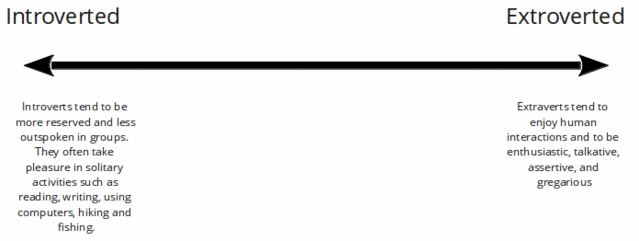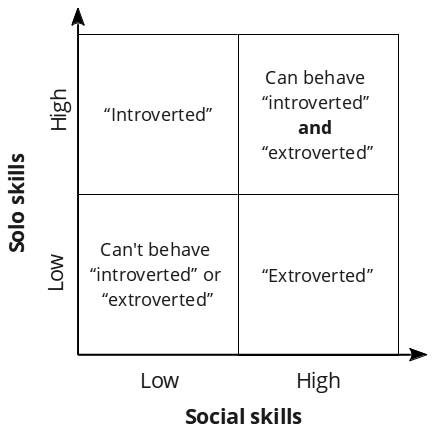Extroversion
Introversion Is Not the Opposite of Extroversion: And vs Or
Part 3: Illustrating the limitation of the Or model
Posted June 5, 2020 Reviewed by Hara Estroff Marano
The first two posts in this series showed two models for introversion and extroversion. I found the following test in a book, to determine whether you’re introverted “or” extroverted, based on the Or model. I believe someone designed it to show empathy for people who consider themselves introverted.
From the And model, it’s almost painful. I’ll translate it in two ways to reveal its bias. First the base test.
An introversion test, from the Or model

On a personal note, I would have found it palliative, when I considered myself introverted and helpless to change. After you read it, I recommend reading my two takes below.
- I like to have long, uninterrupted periods to work on projects, rather than small chunks.
- I sometimes rehearse things before speaking, occasionally writing notes to myself.
- I like to listen more than talk.
- People sometimes think I’m quiet, mysterious, aloof or calm.
- I usually need to think before I respond or speak.
- I like to share special occasions with just one or two people, rather than have a big celebration.
- I tend to notice details many people don’t see.
- If two people have just had an argument, I feel the tension in the air.
- If I say I’ll do something, I almost always do it.
- I feel anxious if I have a deadline or pressure.
- I can zone out if too much is going on.
- I like to watch an activity for awhile before joining in.
- I form lasting relationships.
- I don’t like to interrupt others; I don’t like to be interrupted.
- When I take in lots of information, it takes me a while to sort it out.
- I don’t like overstimulating environments.
- I sometimes have strong reactions to smells, tastes, foods, weather, and noise.
- I am creative and/or imaginative.
- I feel drained after social situations, even when I enjoy myself.
- I prefer to be introduced rather than having to introduce others.
- I often feel uncomfortable in new surroundings.
- I can become grouchy if I’m around people or activities for too long.
- I often dread returning phone calls.
- I like people to come to my home, but I don’t like them to stay a long time.
- I find my mind sometimes goes blank when I meet people or when I am asked to speak unexpectedly.
- I talk slowly or have gaps in my words, especially if I’m tired or if I’m trying to think and speak at once.
- I don’t think of acquaintances as close friends.
- I feel as if I can’t show other people my ideas until they’re fully formulated.
-
Other people may surprise me by thinking I’m smarter than I am.
That test, translated to the And model

I rewrote it to test if you’ve developed your introversion and extroversion skills, taking for granted that you can develop both.
- I like to have long, uninterrupted periods to work on projects or small chunks, whichever works best.
- I sometimes rehearse things before speaking, occasionally writing notes to myself, or to speak extemporaneously when appropriate.
- I like to listen at times, and talk at others.
- People sometimes think I’m quiet, mysterious, aloof or calm, but they see me as outgoing and gregarious other times.
- I need to think before I respond or speak no more or less than others.
- I like to share special occasions with just one or two people. Sometimes I like big celebrations, too.
- I tend to notice details many people don’t see.
- If two people have just had an argument, I feel the tension in the air. I’ve developed social skills to help resolve it.
- If I say I’ll do something, I almost always do it.
- I feel anxious if I have a deadline or pressure.
- I can zone out if too much is going on. I also focus when it helps.
- I like to watch an activity for a while before joining in. Sometimes I like to jump in, too.
- I form lasting relationships and short-term ones, too.
- I don’t like to interrupt others, though I do sometimes when the situation calls for it; I don’t like to be interrupted.
- When I take in lots of information, it takes me a while to sort it out. Sometimes I act first.
- I don’t like overstimulating environments, but I like stimulating ones.
- I sometimes have strong reactions to smells, tastes, foods, weather, and noise. Other times I take them in stride.
- I am creative and/or imaginative. I’m also active and participative.
- I feel drained after some social situations, even when I enjoy myself. Other times I feel invigorated.
- I like to be introduced and I like introducing myself, depending on the situation.
- I feel uncomfortable in new surroundings, but I enjoy familiarizing myself to overcome the discomfort.
- I can become grouchy if I’m around people or activities for too long, so I have learned to manage my emotions and enjoy such situations.
- I used to dread returning phone calls until I learned to enjoy it through practice.
- I like people to come to my home, but I don’t like them to overstay their welcome.
- I used to find that my mind sometimes went blank when I met people or when I was asked to speak unexpectedly, but with experience and practice, that no longer happens.
- I talk slowly or have gaps in my words when the situation calls for me to think and speak at once. When it doesn’t, I speak appropriately to the situation.
- I like to make acquaintances friends.
- I felt as if I couldn’t show other people my ideas until they were fully formulated until I learned to share them effectively.
- Other people may surprise me by thinking I’m smarter than I am.
That test, from the Or model of fitness and intelligence

I rewrote the test into an Or model of fitness and intelligence. I hope you find it as inane as I do.
- I like to have long, uninterrupted periods to study, when my muscles atrophy and my body emaciates.
- I sometimes study nutrition before eating.
- I like to learn more than compete.
- People sometimes think I’m studious, bookish, and inactive.
- I usually need to think before I eat.
- I like to enjoy special occasions with cookies and cake, rather than discipline.
- I tend to read books other people don’t.
- If someone just worked out, I smell the sweat in the air.
- If I say I’ll read something, I almost always read it.
- I feel anxious if I have to walk too far.
- I can zone out watching sports on TV.
- I like to study an activity for a while before trying it.
- I learn a lot.
- I don’t like to intimidate others; I don’t like to be intimidated.
- When I study a lot, it takes me a while to sort it out.
- I don’t like sporting environments.
- I sometimes have strong reactions to health food.
- I am intelligent and thoughtful.
- I feel drained after exercising, even when I enjoy myself.
- I prefer solo activities rather than competition.
- I often feel uncomfortable in competitive environments.
- I can become grouchy if I have to walk too far to the library.
- I often dread gyms.
- I like people to be fit, but I don’t like them to show it off.
- I find my body sometimes gets tired when I have to lift things.
- I walk and climb stairs slowly or take breaks, especially if I’m thinking about my studies.
- I don’t think of jocks as study partners.
- I feel as if I can’t go to the gym until I first get in shape.
- Other people may surprise me by thinking I’ve read more than I have.


